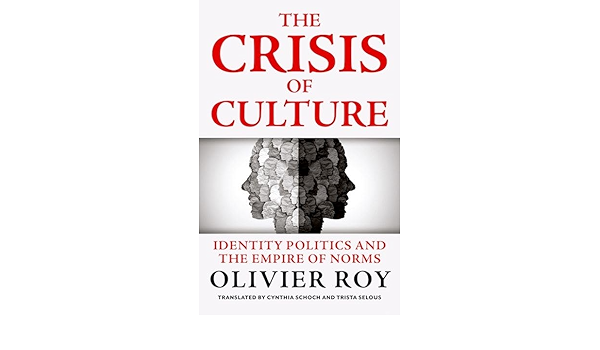The Crisis of Culture: Identity Politics and the Empire of Norms
Translated by Cynthia Schoch and Trista Selous (Hurst, £20.00)
I have promised myself that should I win the lottery, I would employ an ‘explainer’. There is so much about the modern world that I do not ‘get’.
And it is not only TV advertisements and the films that they punctuate. Consider two recent puzzles. Constitutions are intricate.
Their composition demands the combined skills of a Machiavellian Prince and the wisdom of Plato’s philosopher kings to bring social conventions, legal theory, political and moral philosophy into harmony.
They are creatures of their time and as times move on they are amended. To justify an amendment, basic questions must be answered.
What are constitutions for? What belongs to a constitution and what to the legislature? What precisely does the constitution say and what are the implications of the new wording?
None of the professional politicians that populate our main political parties gave any thought to these questions as they proceeded to spend €20 million on the recent referendum.
They collapsed into incoherence when the questions were raised. What planet, I ask myself, do they inhabit? One where constitutions are no more than collections of slogans?
I cannot get my head around today’s preoccupation with ‘identity’. So it is no surprise that I was thrown into confusion by the invitation to celebrate ‘Transgender visibility day’.
I had thought that ‘transgender’ was not an identity, that invisibility was its object. So the ‘trans’ aspect of a male identifying as a woman should go unremarked as she raced to the finishing line well ahead of her [biological] female competitors.
You may be pleased to learn that while I have not won the lottery, I have found an ‘explainer’ who does address my confusions in a most helpful manner.
Olivier Roy is professor at the European University Institute in Florence. He has published six esteemed books on religion and politics. Now we have this general study of the condition of our western culture.
He distinguishes ‘anthropological culture’ from ‘high culture’. The former are the notions of what is and what should be that shapes our lives in common.
It is the shared ‘picture’ of the world that underpins cooperation and contains conflicts. High culture emerges from anthropological culture as we reflect on our condition, seeking to understand ourselves with the resources of art, literature, philosophy, history.
Anthropological
We should not overestimate the unifying power of anthropological culture. Diversity, difference, conflict are the order of the day. Sub-cultures are important.
For example, Irish emigrants brought their culture with them to the USA. It provided an ethnic identity that supported them in their struggles as they climbed the social ladder.
It now gives a distinctive flavour to their participation in the general culture. The dynamic between the general and subcultures, played out through history has formed our world.
Roy points out that the general culture is weakening. The dynamic is undone. We no longer have a map with its mountains and plains with which to orientate ourselves.
We are lost and resort to ‘subcultures’ to find our identities, competing for recognition on the basis of the oppressions we have endured.
His explanation of why this is happening is necessarily complicated. He outlines the factors at play in lucid prose. Economics, of course, plays a major role.
Its lens which dominates how we see the world, presents us as individual consumers while putting out of view the fact that we are also producers, enmeshed in relationships beyond the ken of economics.
Love and commitment have been sidelined as contract and consent control engagements among the sexes.
Globalisation weakens the nation-state. Territory, a foundation of the nation-state loses its significance. The internet contributes to this ‘deterritorialisation’ as we roam the virtual world, face-to-screen encounters supplement, if not displace, face-to-face meetings.
The sense of commonality engendered by the nation-state finds no equivalent in this new world. Roy notes, with asperity, the feebleness of the European Union’s efforts to concoct a common European identity.
The impact on high culture is considerable. The humanities that once enabled us to see the past as tragedy, threaded with the hope of salvation, opening on to a better future, no longer supports such grand narratives.
History, now a melodrama, is flattened to a collection of unsavoury incidents whose relevance is disconnected from their distance in time.
The literary canon is dismissed as the work of privileged white patriarchs and imperialists, philosophy is ‘deconstructed’ to reveal the face of power it contrived to conceal.
The decision of Trinity College to remove the name Berkley, one of Trinity College’s most noted graduates and illustrious lecturer, illustrates the trend.
George Berkley (1685-1753) was a man of many parts, an Anglican minister, a bishop of Cloyne, an educationalist (with an interest in the education of women), an outstanding philosopher whose work continues to command attention and for a period, the owner of a plantation in Rhode Island, USA and of several slaves who worked there. It is this last that enraged students who mobilised to push for the ‘denaming’.
We have here an impoverished view of history joined with an indifference to the contribution of philosophy resulting in a politics that gives up on the future as it turns to enjoy righteous anger at the wrongs of the past.
Excusable in the uneducated young, unpardonable in those entrusted, by the taxpayer, to educate them and who colluded in their campaign.
Roy concludes “what we are living through now is a true crisis of humanism”. This is the modern world our elites would have us welcome.
Olivier Roy is Professor at the European University Institute in Florence. Six of his highly acclaimed books on religion and politics are published by Hurst, including Globalised Islam; Jihad and Death; Holy Ignorance; and Is Europe Christian?



